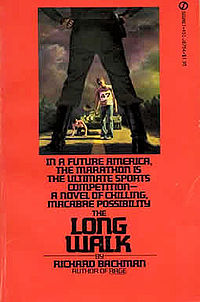
Book Review: Richard Bachman's The Long Walk
Public enjoyment of others' grueling and gut-wrenching struggles has been a common phenomenon since humanoids decided to pretend to function using our brains. From the Colosseum to Bravo, it seems everyone loves a good Roman holiday. Richard Bachman’s (Stephen King incognito, for those unhip) 1979 novel The Long Walk perfectly illustrates man's dark desire to see others suffer.
In this dystopian alternate reality, the United States is a totalitarian nation, as a result of the other guys winning World War II. Its national pastime is something known as the “The Long Walk.” A hundred teenage boys line up at the US-Canadian border and begin walking, having to maintain a pace of at least four miles per hour with no stopping. There is no stopping, no rest, and no intermissions for meals, imminent weather, or personal needs. The Walk ends only when a single “walker” is left alive. The Major - the man behind the event - is often seen riding in a truck, with several armed soldiers, behind the throng of boys, shouting empty encouragement about winning the Walk and receiving “The Prize” (anything they want for the rest of one of their lives) and allotting water or food canteens at designated times of the day.
If any of the boys slow below the speed of four miles an hour or interact with bystanders and do not stay on the road, they are “ticketed.” Each contestant is allowed up to three tickets an hour; the fourth results in the walker's being shot to death on the road alongside his competition. The boys are forced to endure grueling physical challenges presented by their failing bodies, the torturous mental abuse of self-motivation in the face of certain death, and the horror of bearing witness to the deaths of their competitors. The protagonist of the story, sixteen year-old Raymond Garraty, becomes close friends with several other “walkers,” despite their current predicament and inevitable fate. Through Raymond, the brutal senselessness of ritual is cast in a human light.
Though the book concerns only a single Walk, its momentum is flawless. The early introduction of the character cliques immediately establishes a connection in which the reader feels helplessly involved; rooting, hopelessly, as surrogate family and friends of the boys trudging toward their doom. The juxtaposition of ruthless competition and the human need for companionship drives the story compellingly to its fluttering end, leaving the reader feeling listless and hollow, engrossed and exhausted. Emotionally, The Long Walk can feel like just that, but it's a highly worthwhile journey all the same.

